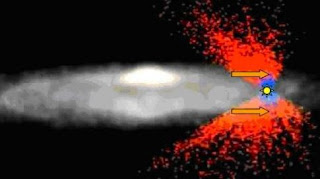 |
| Movement of matter in galaxy. |
The movement of stars in galaxies appears to be circular, as merger predicts, while the patterns in features of galaxies may describe spiralling. Orbits are so vast and stars trajectory relatively slow that gradual spiralling may appear circular.
The movement of matter makes patterns in galaxies that show a general and gradual outward spiral (like the speed of stars that uniformly slow across the galaxy). Outward spiralling may indicate why the central object is so influential as that movement may originate near the galaxy centre. That's the location of a Super Massive Black Hole and nothing should escape those.
And yet, these galaxy cores behave strangely. Instead of matter being gobbled up by immense gravity, some seems to move away in what's called 'outflow'. Large amounts of matter may spread out across the galaxy in a process that escapes the middle. Hot new blue stars have been found in a disc around Andromeda's centre as outflow, in some cases, may generate a star forming region.
Rather than moving in circles around the center of the Milky Way, all the stars in our Galaxy are travelling along different paths, moving away from the Galactic center. This has just been evidenced by Arnaud Siebert and Benoit Famaey, astronomers at the Strasbourg Astronomical Observatory, and by their colleagues in other countries. Credit: Gal Matijevic, Ljubljana University










